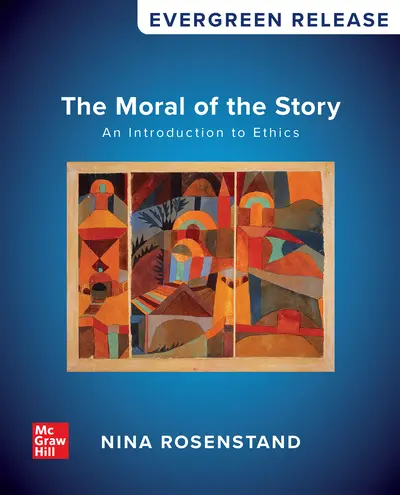My Account Details

ISBN10: 1266549366 | ISBN13: 9781266549366

The Moral of the Story: An Introduction to Ethics
Product not yet available for student view. Change to an older release to view student options.
- Lowest Price!
McGraw Hill eBook
Textbook Rental (150 Days Access)
- Rent for a fraction of the printed textbook price
- Complete text bound in hardcover or softcover
Loose-Leaf Purchase
Unbound loose-leaf version of full text
Shipping Options
- Standard
- Next-day air
- 2nd-day air
Orders within the United States are shipped via FedEx or UPS Ground. For shipments to locations outside of the U.S., only standard shipping is available. All shipping options assume the product is available and that processing an order takes 24 to 48 hours prior to shipping.
Note: Connect can only be used if assigned by your instructor.
Connect (180 Days Access)
- Digital access to a comprehensive online learning platform
- Includes homework, study tools, eBook, and adaptive assignments
- Download the free ReadAnywhere app to access the eBook offline
Connect + Loose-Leaf
- Comprehensive online learning platform + unbound loose-leaf print text package
- Connect includes homework, study tools, eBook, and adaptive assignments
- Download the free ReadAnywhere app to access the eBook offline
Shipping Options
- Standard
- Next-day air
- 2nd-day air
Orders within the United States are shipped via FedEx or UPS Ground. For shipments to locations outside of the U.S., only standard shipping is available. All shipping options assume the product is available and that processing an order takes 24 to 48 hours prior to shipping.
McGraw Hill eBook
Details:
- Normally the lowest price option for student
- Integrates in your LMS
- Accessible tools for students, including read-aloud functionality, jump links and dynamic note-taking and highlighting features
Textbook Rental (150 Days Access)
Details:
- Rentable option
- Hardcopy and softcover formats
Loose-Leaf Purchase
Details:
- Unbound loose-leaf version of full text
Connect (180 Days Access)
Details:
- Integrates in your LMS
- Prebuilt courses, presentation slides and instructor resources
- Test question banks, adaptive assignments, essay prompts, video content and more interactive exercises specific to your course subject
- eBook access (with included ReadAnywhere app)
- Print book add-on availability
- Remote proctoring
Connect + Loose-Leaf
Details:
- Comprehensive online learning platform + unbound loose-leaf print text package
- Connect includes homework, study tools, eBook, and adaptive assignments
- Download the free ReadAnywhere app to access the eBook offline
* The estimated amount of time this product will be on the market is based on a number of factors, including faculty input to instructional design and the prior revision cycle and updates to academic research-which typically results in a revision cycle ranging from every two to four years for this product. Pricing subject to change at any time.
The Moral of the Story continues to make difficult concepts in moral philosophy comprehensible through storytelling and story analysis. To help students apply moral theories to the world around them, each chapte concludes with a section of Primary Readings with excerpts from classical and contemporary texts, along with a selection of Narratives, stories that illustrate the moral issues raised in the chapter. Study questions are included throughout. New examples from popular culture, current events, and television shows and movies (e.g. The Last of Us, Black Mirror) are examined to explore chapter themes and reinforce the daily relevance of the moral and ethical questions that are raised.
2 Learning Moral Lessons from Stories
3 Ethical Relativism
4 Myself or Others?
5 Using Your Reason, Part 1: Utilitarianism
6 Using Your Reason, Part 2: Kant’s Deontology
7 Personhood, Rights, and Justice
8 Virtue Ethics from Tribal Philosophy to Socrates and Plato
9 Aristotle’s Virtue Theory: Everything in Moderation
10 Virtue Ethics and Authenticity: Contemporary Perspectives
11 Case Studies in Virtue
12 Different Gender, Different Ethics?
13 Applied Ethics: A Sampler
About the Author
Nina Rosenstand
Nina Rosenstand holds a traditional Magisterkonferens Degree from the University of Copenhagen, Denmark. Her dissertation, awarded the Gold Medal of the University of Copenhagen, was on the philosophy of Henri Bergson. She is the author of The Concept of Myth (Danish: Mytebegrebet), The Human Condition: An Introduction to Philosophy of Human Nature, and The Moral of the Story: An Introduction to Ethics, as well as numerous papers and articles. She is senior professor of philosophy at San Diego Mesa College, Social Sciences Department, teaching on-campus as well as online classes. Her areas of specialization are moral philosophy, philosophy of human nature, and philosophy of fiction. She is chair of the department’s colloquium series, Social Sciences Occasional Lectures.
Need support? We're here to help - Get real-world support and resources every step of the way.